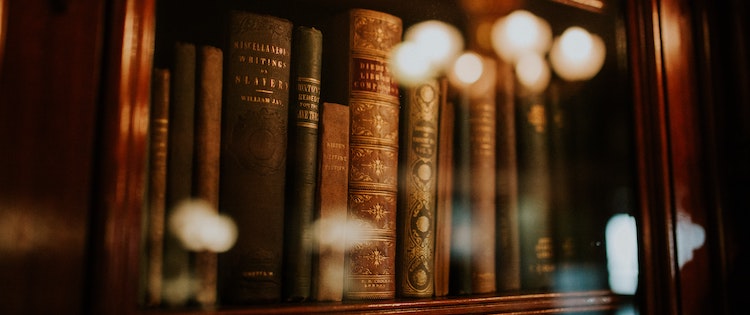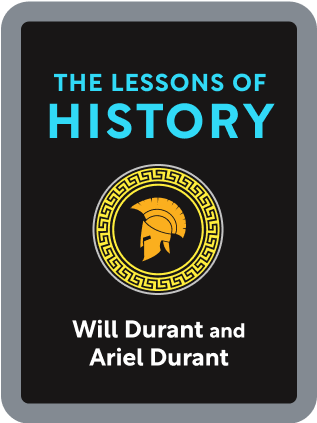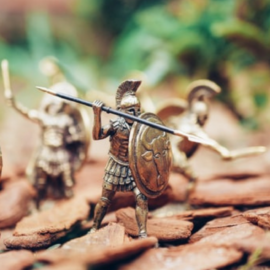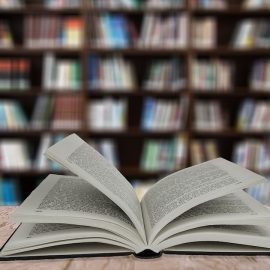

This article is an excerpt from the Shortform book guide to "The Lessons of History" by Will Durant and Ariel Durant. Shortform has the world's best summaries and analyses of books you should be reading.
Like this article? Sign up for a free trial here .
Do you wonder what we can learn from history? What can it tell us about the world and ourselves today?
In The Lessons of History, Will and Ariel Durant present the most compelling patterns they found in their extensive research of human history. These patterns teach us important lessons about human nature, society, economics, government, religion, war, and civilization itself.
Read more to see what we can learn from history.
What We Can Learn From History
What lessons do 5,000 years of history hold? Are we in truly novel times, or do we face the same problems that the Romans and Egyptians faced 2,000 years ago?
Will and Ariel Durant, Pulitzer Prize-winning historians, are famed for writing The Story of Civilization, a massive 9766-page, 11-volume treatise of the entirety of Western history. They compiled the most important patterns in this book, The Lessons of History. Ray Dalio, the founder of the world’s largest hedge fund Bridgewater, considers this one of his three must-read books.
The Durants are known for writing many volumes of history. With this book, they aimed to point out what we can learn from history.
What History Teaches Us About Equality
The laws of biology are the fundamental lessons of history—humans are subject to the trials of selection and the struggle for existence, like all other animals. The group and nation merely inherits the will of the individual—after all, societies are made up of individuals.
Human nature has largely been unchanged throughout history—the means change, but the motives stay the same. The Lessons of History includes what we can learn from history about equality.
Humans are born with different abilities, and so inequality among humans is a natural consequence. This is magnified by the complexity of civilization, as each invention is seized by the strong to make themselves stronger, and the weak weaker.
- Freedom and equality are fundamentally opposed. If people are given freedom, their natural differences in ability will materialize in different outcomes. If people were forced to show equal outcomes and equal abilities, this reduces freedom.
- The best that egalitarians can hope for in a free society is an approximate equality of legal justice and educational opportunity.
- Society is made up of the imitative majority and the innovating minority. History in general is the “conflict of minorities” and the majority “applauds the victor and supplies the human material of social experiment.”
What History Teaches Us About Social Stability
Culture, customs, and morals provide a useful social stabilizing force, and a dampening force on innovation. What practices survive to present day have survived over time because they worked. New changes need to be put through the crucible of criticism before overthrowing the result of centuries of experiment.
What History Teaches Us About Morals
Morals change with the times as a reflection of what is necessary to grow and survive.
- Hunting/gathering promoted survival at all costs, including fighting and killing, and gluttony during the rare feast.
- Agriculture spurred the importance of hard work and regularity more than violence and bravery.
- Industry promoted individualism separated from the family; materialism and mass consumption; and delaying marriage along with premarital sex.
What History Teaches Us About Religion
What we can learn from history about religion is essentially that religion has been constantly present.
- On the positive, religion has given “supernatural comforts” to many, even the most unfortunate, and provided social stability through divine surveillance and moral prescriptions handed down by gods.
- On the negative, religion has been used as a tool of the state to legitimize power, has seen corrupt abuses of power (eg the Crusades).
- “As long as there is poverty there will be gods.”
What History Teaches Us About Economics
Every economic system must eventually rely on some form of profit motive to stir people to productivity. Alternatives like slavery, brute force management, or ideology have historically proved too unproductive or unsuccessful.
What History Teaches Us About Government
The constant friction in societal structure is between the rulers and the ruled.
- The natural progression of government is from monarchy to aristocracy to democracy and back again. Democracy passes to monarchy/tyranny when civil strife weakens the state, revolution is threatened, and a figure arrives promising security and opportunity for all.
- Like a heartbeat, societies alternate in cycles of wealth concentration and redistribution (violent or peaceful).
- Communism has taken on capitalist flair to stimulate productivity, and capitalism has taken on socialist programs to curb discontent with inequality, and so the two converge.
What History Teaches Us About War
What we can learn from history about war is that war is a constant. In the past 3421 years, there have been only 268 years of no documented war.
- War occurs for the same reason individuals fight – to secure more resources and power, for pride, to survive under threat.
- The state inherits the will of the individual, without the individuals’ normal boundaries. The state that is strong enough defies interference with its will and has no superstructure it is beholden to.
- Philosophers will muse about the futility of war, but generals understand that war is the final arbiter of history.
What History Teaches Us About Civilizations
Civilizations have grown and decayed with great regularity.
- The decay comes as a failure of leadership to meet new challenges (be it natural or manmade) and often finalized with a defeat in war.
- While likely inevitable, the fall of our civilization is not to be bemoaned – what is created in the civilization can be immortal. More people read Homer today than in his time.
This is a quick look at what we can learn from history by examining its patterns.

———End of Preview———
Like what you just read? Read the rest of the world's best book summary and analysis of Will Durant and Ariel Durant's "The Lessons of History" at Shortform .
Here's what you'll find in our full The Lessons of History summary :
- What we can learn from studying 5,000 years of history
- How human nature hasn’t changed over thousands of years
- Why all civilizations, including ours, fall, and why we shouldn’t cry about it







I am not sure I agree. We are here because of the success of our past which is our parents back through to antiquity. My understanding is as we near the end of civilization as is obvious to a small minority the majority remain ignorant and politically convenient. If we could learn from history and evolution we would learn that the minority rule and who to follow.